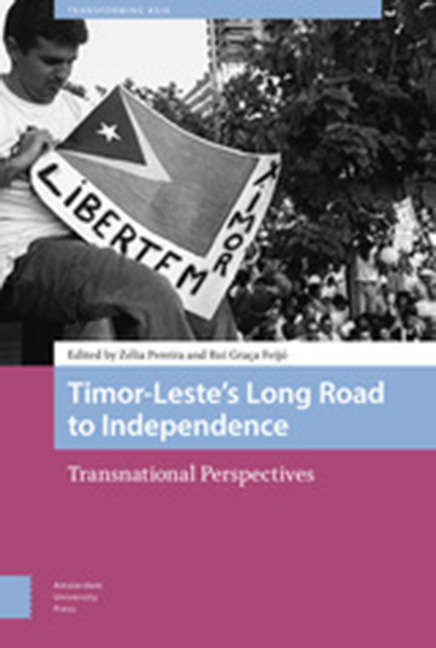Book contents
- Frontmatter
- Contents
- Acknowledgements
- A Note on the Name of the Country
- List of Figures
- Introduction: Timor-Leste’s Long Road to Independence: Outline for an Analytical Framework
- Part One Before The Portuguese Decolonisation
- Part Two The Portuguese Revolution Arrives In Timor-Leste
- Part Three Reaction To The Indonesian Invasion Of Timor-Leste
- Part Four Resisting The Indonesian Annexation Of Timor-Leste
- Index
Introduction: Timor-Leste’s Long Road to Independence: Outline for an Analytical Framework
Published online by Cambridge University Press: 14 February 2024
- Frontmatter
- Contents
- Acknowledgements
- A Note on the Name of the Country
- List of Figures
- Introduction: Timor-Leste’s Long Road to Independence: Outline for an Analytical Framework
- Part One Before The Portuguese Decolonisation
- Part Two The Portuguese Revolution Arrives In Timor-Leste
- Part Three Reaction To The Indonesian Invasion Of Timor-Leste
- Part Four Resisting The Indonesian Annexation Of Timor-Leste
- Index
Summary
Abstract
The first part discusses the self-determination of Timor, underlying the features that singularise it in the context of Portuguese decolonisation and late-twentieth-century national emancipation. It calls attention to its transnational character. It stresses the “golden triangle” of armed struggle, clandestine activity and diplomatic efforts during the period of Indonesian occupation and the importance of the emerging Timorese Catholic Church in the formation of a plural form of nationalism. The second part offers comments on all the chapters in the collection.
Keywords: Timor, Portugal, Indonesia, United Nations, nationalism, decolonisation, resistance, Timorese Catholic Church
Monday, May 20, 2002. The Democratic Republic of Timor-Leste is proclaimed as a new independent state to international applause. The day marks the end of a very long and winding road initiated in the wake of the Portuguese Carnation Revolution back in 1974. Before reaching this point, Timor-Leste travelled from a backward, half-forgotten Portuguese colony freed from the Japanese domination at the end of World War II – a time when the world started moving from “the age of Empire to the age of super-powers,” including the overarching Cold War (Hilton and Mitter 2013) – to a dramatic annexation by neighbouring Indonesia. The “first wave of decolonisation” began right at the territory's vicinity with the unilateral proclamation of independence by the Republic of Indonesia on August 17, 1945. Indeed, the Southeast Asia colonies occupied by the Japanese created, at the time of its debacle, “an opportune moment making it difficult if not impossible for colonial powers to recover their positions” (Shipway 2008: 61). This long process first witnessed the return and then a continuation of the Portuguese domination in fierce opposition to the winds of change that rocked the foundations of European colonialism in Asia and Africa before the mid-1970s, staging resistance to the proclamations of a new, emerging international law supported by the United Nations (Alexandre 2017; Santos and Pereira 2022). This was followed by a short, nineteen-month period during which post-authoritarian Portugal tried to develop a self-determination programme for all its colonies. This was a period in which “a series of weak and unstable provisional governments in Portugal could exercise little agency and were often reduced to hapless observers” (MacQueen 2018: 62). In the case of Timor, efforts to secure an “exemplary decolonisation” failed dramatically. A unilateral declaration of independence on November 28, 1975, was short-lived and was never recognised by more than a handful of countries.
- Type
- Chapter
- Information
- Timor-Leste's Long Road to IndependenceTransnational Perspectives, pp. 17 - 58Publisher: Amsterdam University PressPrint publication year: 2023

